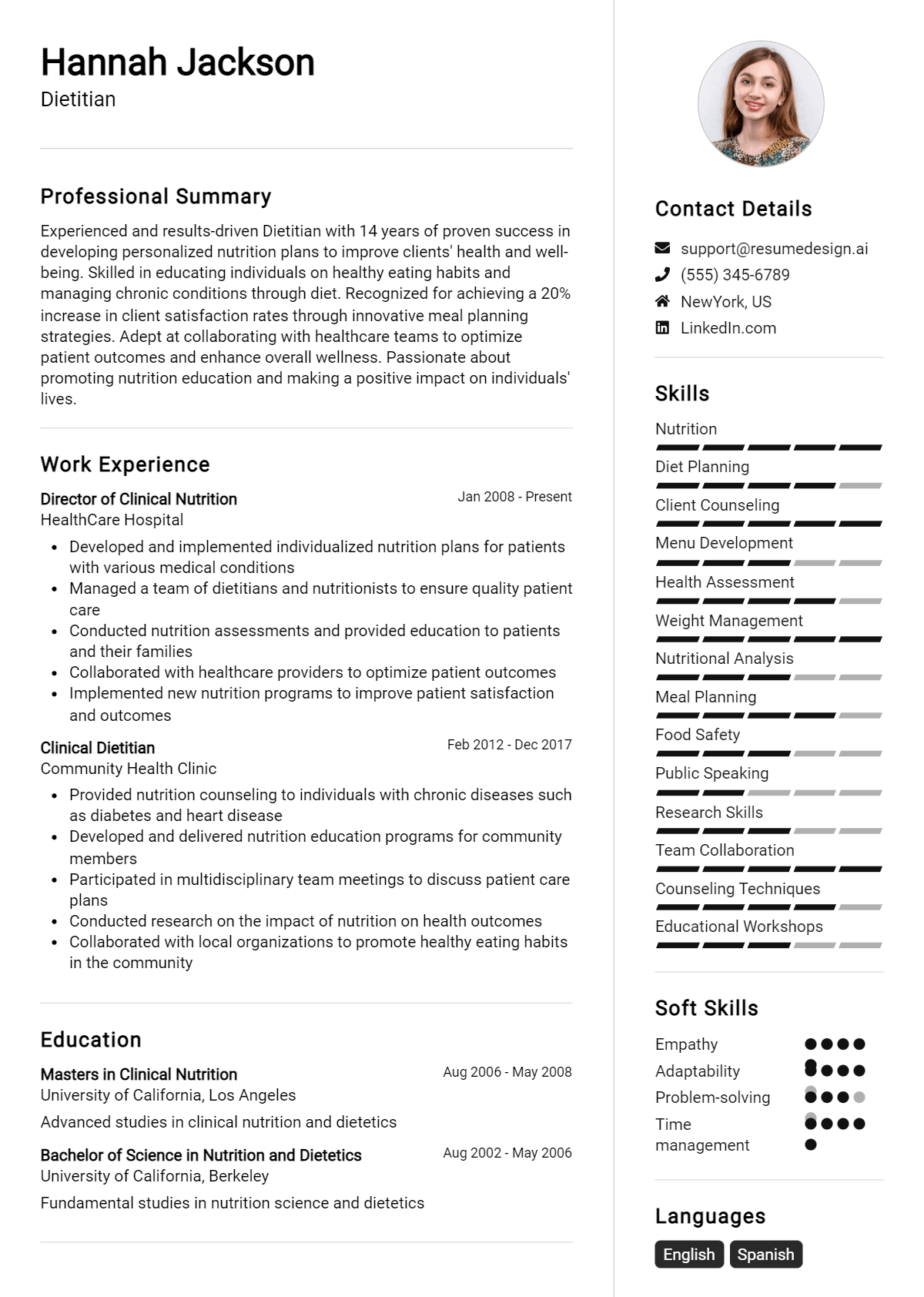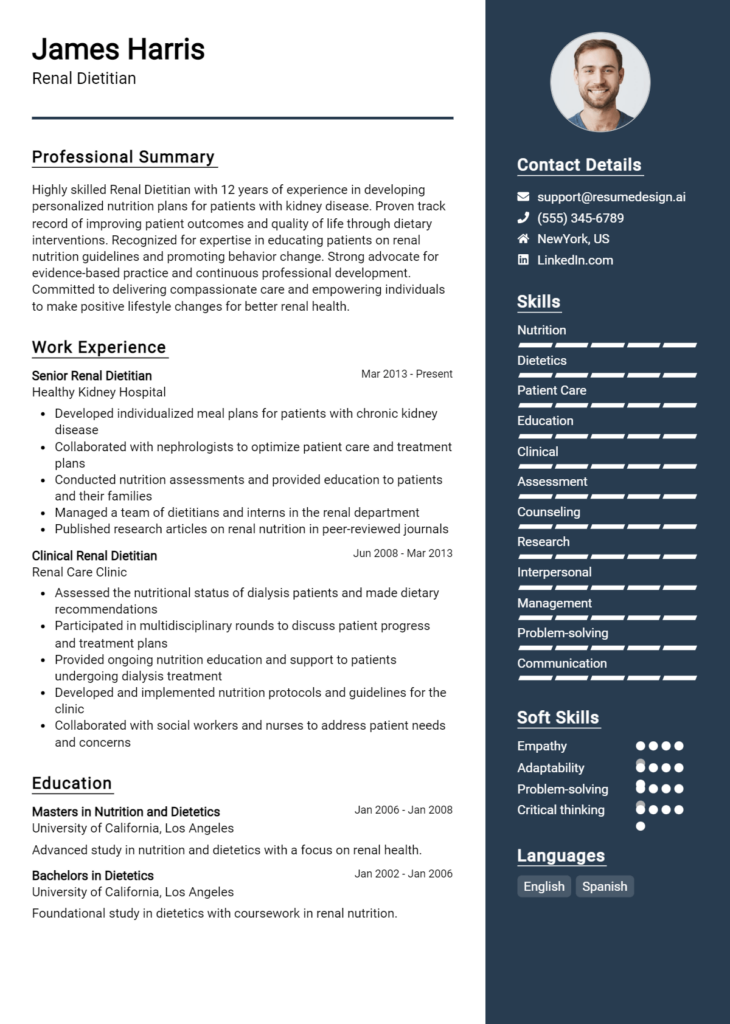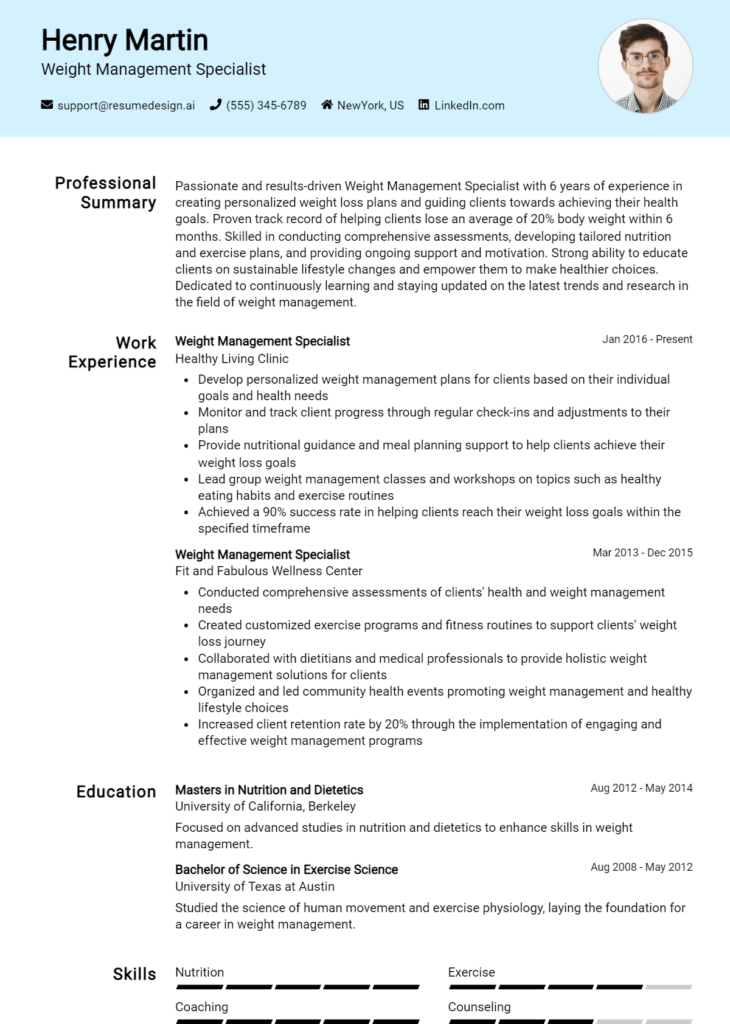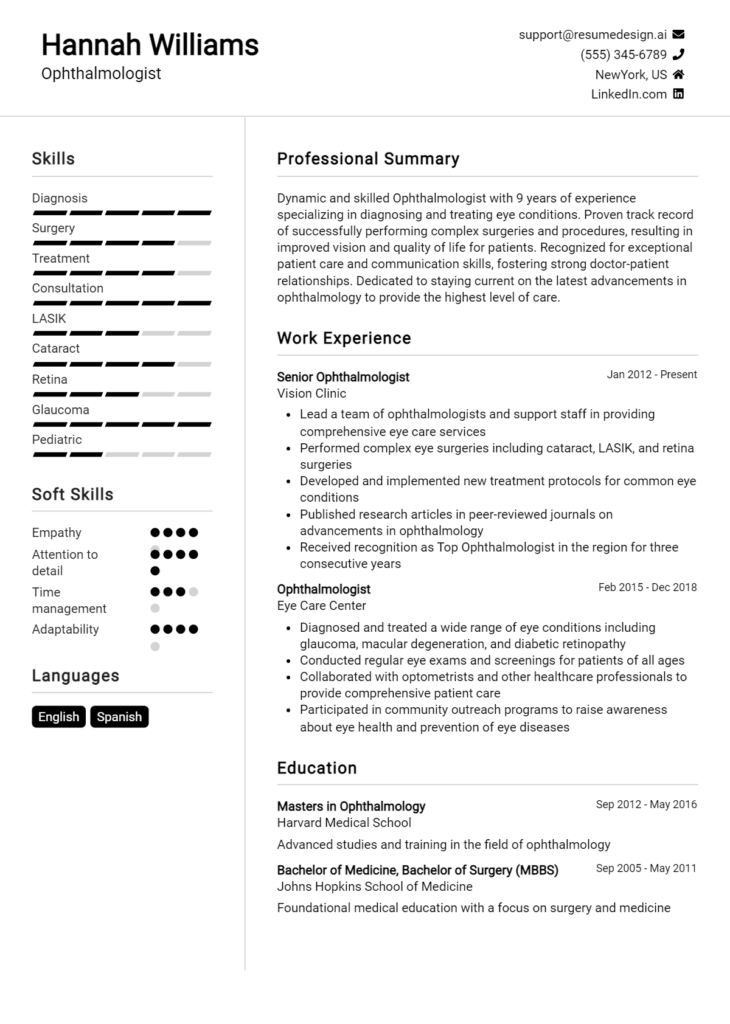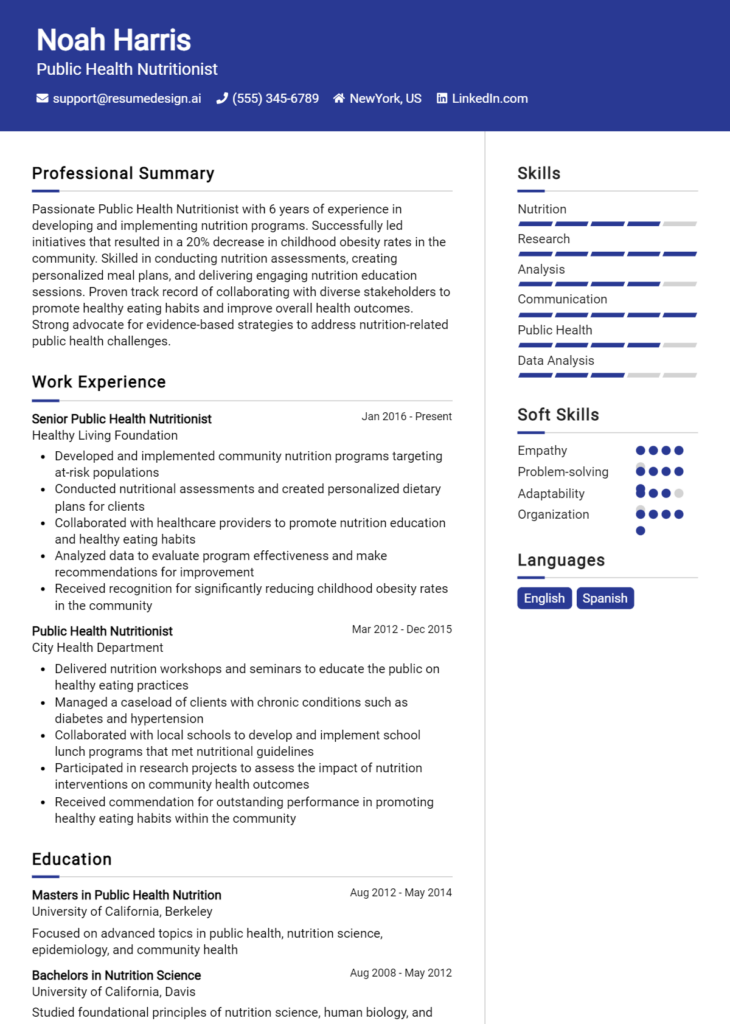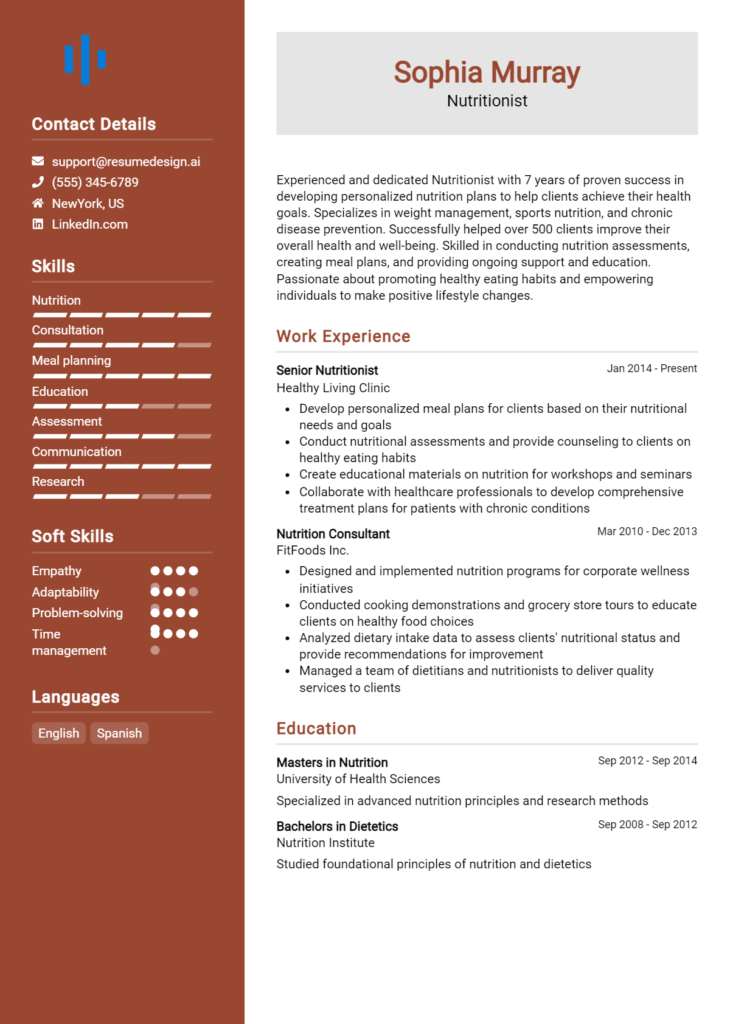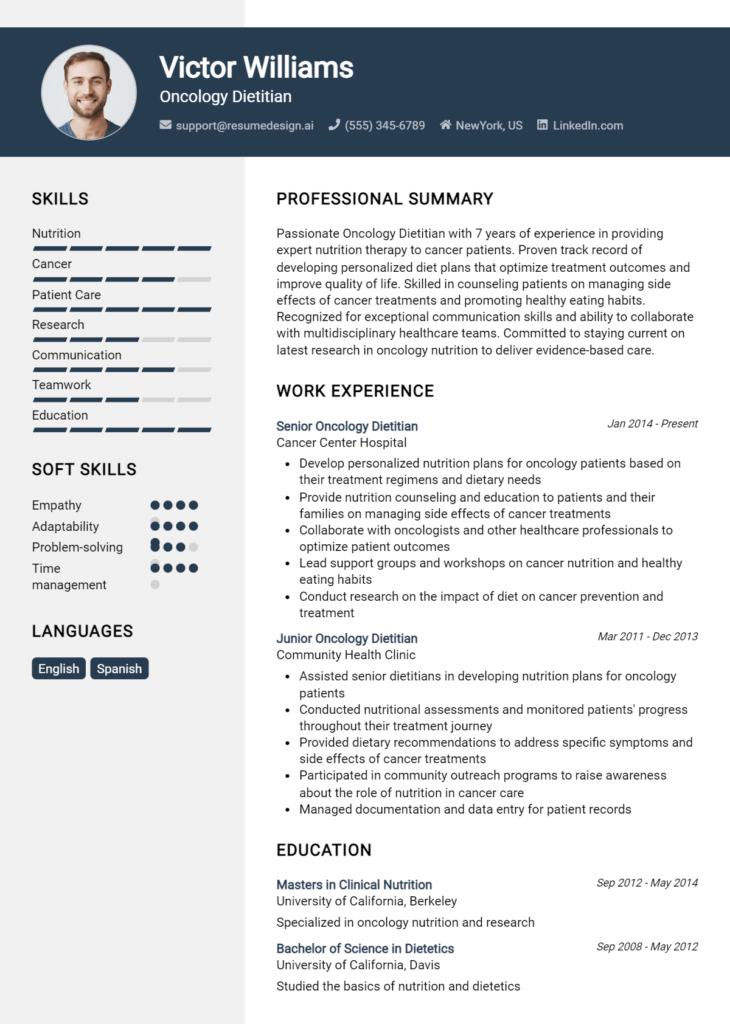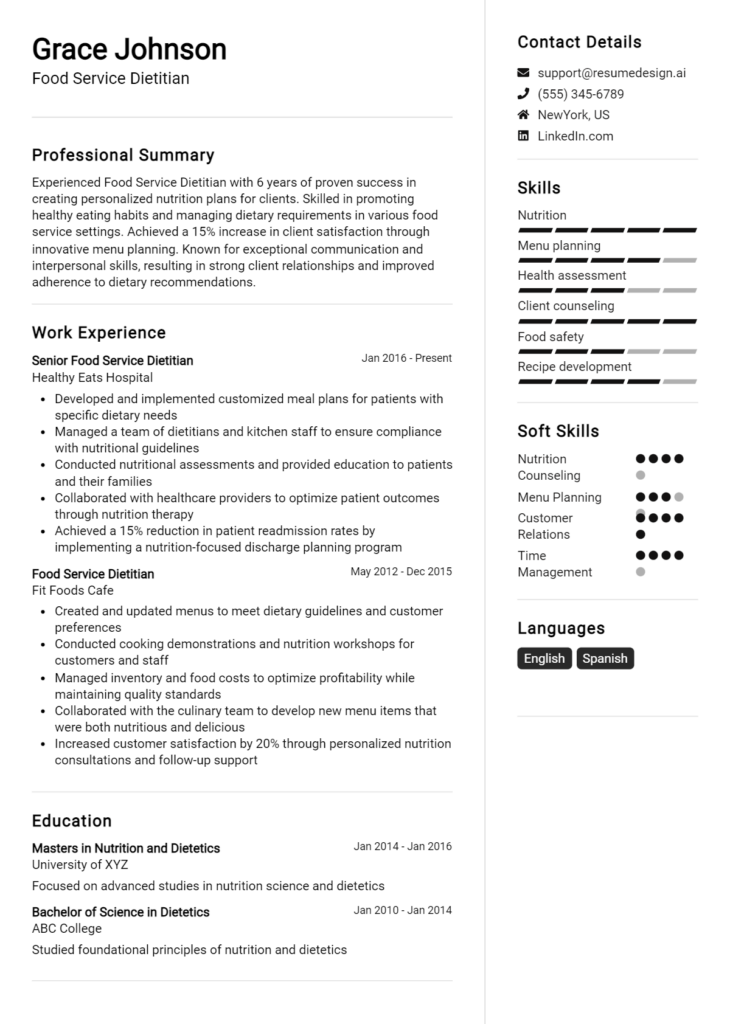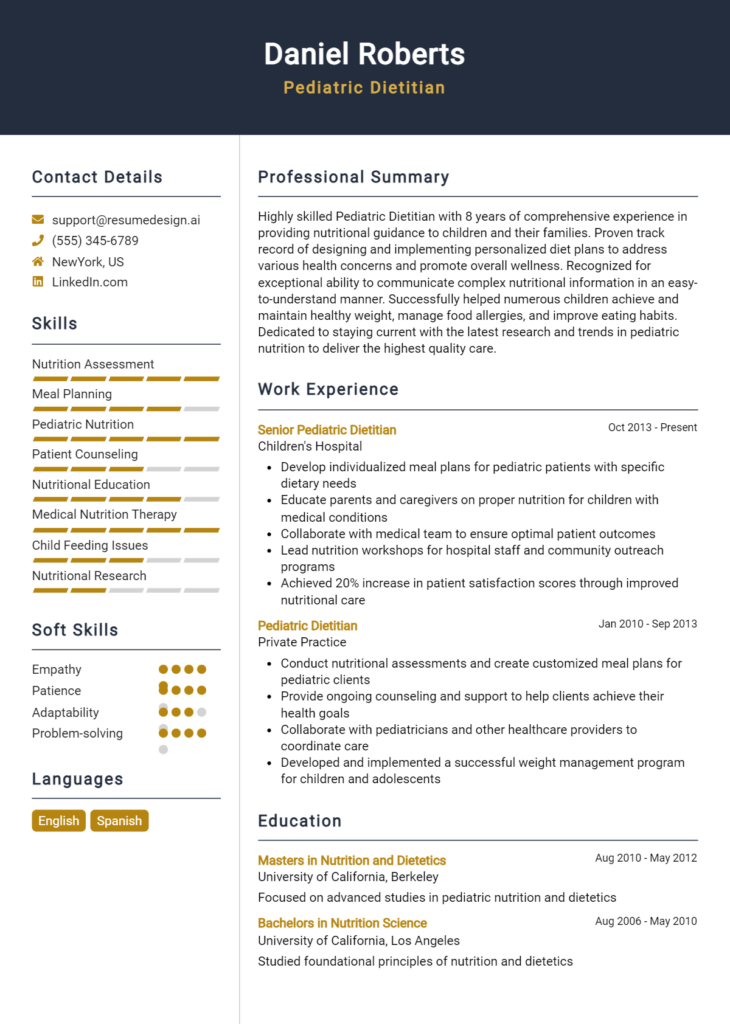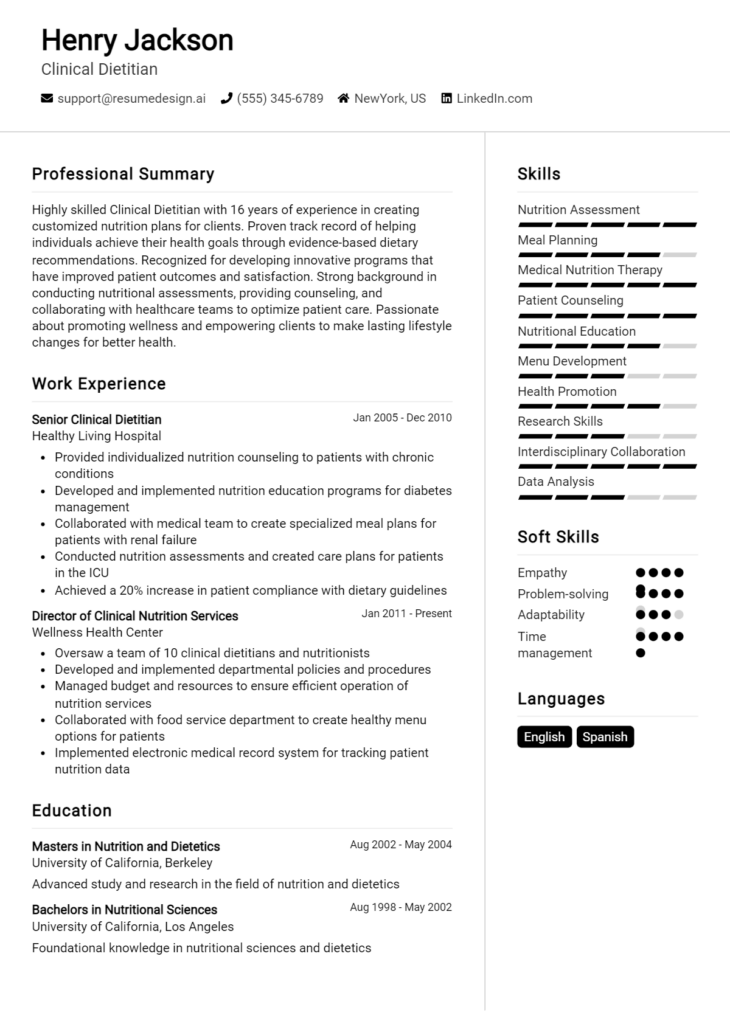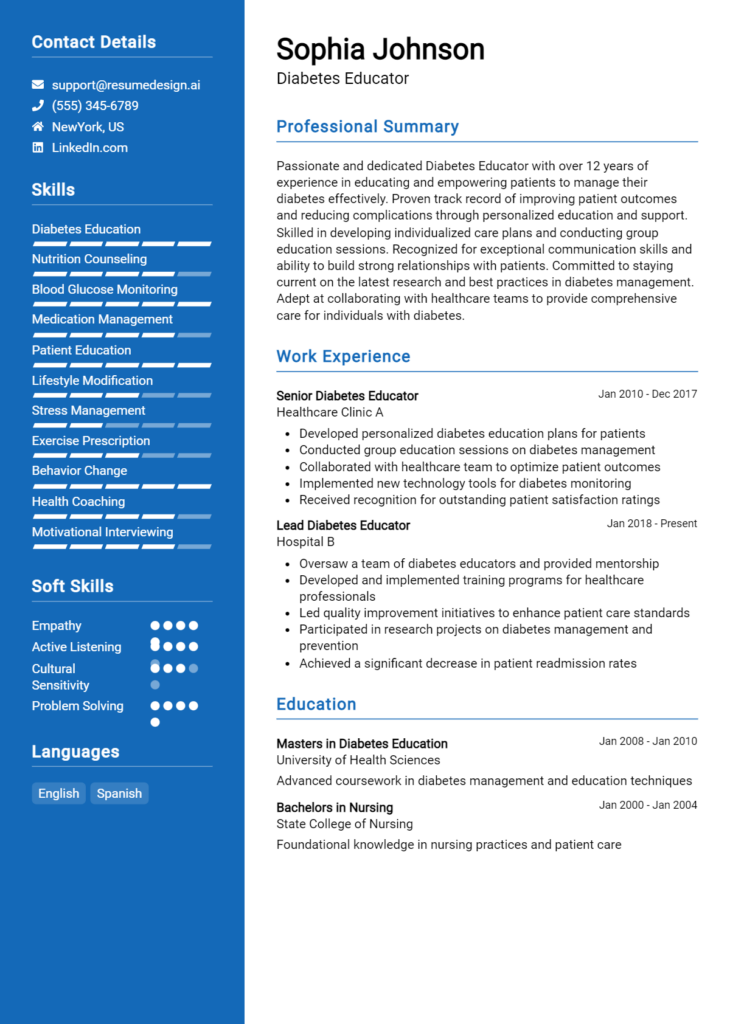Dietitian Core Responsibilities
Dietitians play a vital role in promoting health and wellness by developing personalized nutrition plans that cater to diverse patient needs. Key responsibilities include assessing nutritional requirements, educating clients, and collaborating with healthcare professionals to ensure comprehensive care. They must possess strong analytical, operational, and problem-solving skills to effectively translate complex dietary information into actionable strategies. A well-structured resume can highlight these qualifications, showcasing how dietitians contribute to organizational goals by improving patient outcomes and enhancing overall health services.
Common Responsibilities Listed on Dietitian Resume
- Conduct nutritional assessments and evaluations.
- Develop and implement individualized meal plans.
- Educate patients and families on dietary practices.
- Collaborate with medical teams to address patient needs.
- Monitor and analyze patient progress and dietary adherence.
- Stay updated on nutrition research and trends.
- Provide nutrition education workshops and seminars.
- Advise on food service management and menu planning.
- Utilize software for tracking dietary intake and outcomes.
- Support community health initiatives and programs.
- Conduct food safety and sanitation training.
- Write reports and documentation for patient care plans.
High-Level Resume Tips for Dietitian Professionals
In the competitive field of dietetics, a well-crafted resume can be the key to unlocking new career opportunities. As the first impression a potential employer has of a candidate, a dietitian's resume must effectively showcase their skills, achievements, and unique qualifications. It serves as a marketing tool, highlighting the candidate's expertise in nutrition, patient care, and health promotion. This guide will provide practical and actionable resume tips specifically tailored for dietitian professionals, ensuring that your resume stands out in a crowded job market.
Top Resume Tips for Dietitian Professionals
- Tailor your resume to the specific job description by using keywords and phrases from the posting.
- Highlight relevant experience by focusing on internships, clinical rotations, and previous employment in nutrition-related roles.
- Quantify your achievements by including metrics such as the number of clients served, percentage improvements in health outcomes, or successful programs implemented.
- Showcase industry-specific skills, such as knowledge of dietary guidelines, food safety regulations, and experience with nutritional assessment tools.
- Include certifications and licenses prominently, such as Registered Dietitian Nutritionist (RDN) or Certified Diabetes Educator (CDE).
- Utilize a clean and professional format that enhances readability, making it easy for hiring managers to scan your resume quickly.
- Incorporate a summary statement that encapsulates your professional identity and key qualifications at the top of your resume.
- Demonstrate your commitment to ongoing education by listing relevant continuing education courses or professional development activities.
- Consider including volunteer work or community involvement that showcases your dedication to public health and nutrition.
By implementing these tips, dietitian professionals can significantly increase their chances of landing a job in the field. A well-structured and targeted resume not only highlights your qualifications but also communicates your passion for nutrition and commitment to improving health outcomes. Stand out from the competition and make a lasting impression on potential employers with a resume that truly reflects your expertise and achievements.
Why Resume Headlines & Titles are Important for Dietitian
In the competitive field of dietetics, a well-crafted resume headline or title can serve as a critical first impression for hiring managers. It encapsulates a candidate's key qualifications and unique strengths in a concise and impactful phrase, making it easier for recruiters to identify the right fit for their team. A strong headline not only grabs attention immediately but also sets the tone for the rest of the resume, effectively summarizing the candidate’s expertise in areas such as clinical nutrition, dietary counseling, or community health. Therefore, it is essential that the headline be relevant, direct, and tailored to the specific job being applied for, ensuring that it resonates with the employer's needs.
Best Practices for Crafting Resume Headlines for Dietitian
- Keep it concise—aim for one impactful phrase.
- Make it role-specific to clearly indicate your area of expertise.
- Incorporate relevant keywords from the job description.
- Highlight your most notable accomplishments or skills.
- Avoid jargon or overly technical language that may confuse readers.
- Use strong action verbs to convey confidence and capability.
- Ensure it reflects your professional identity and goals.
- Revise and refine until it feels compelling and aligned with your experience.
Example Resume Headlines for Dietitian
Strong Resume Headlines
"Certified Clinical Dietitian Specializing in Nutritional Counseling and Patient Education"
“Registered Dietitian Nutritionist with Proven Experience in Weight Management and Disease Prevention”
“Experienced Community Dietitian Dedicated to Promoting Healthy Eating Habits in Diverse Populations”
Weak Resume Headlines
“Dietitian Looking for a Job”
“Nutrition Professional”
The strong headlines are effective because they are specific and highlight the candidate's qualifications, making it easy for hiring managers to see the alignment with their needs. They emphasize areas of expertise and notable accomplishments, immediately establishing credibility. In contrast, the weak headlines fail to make an impact due to their vagueness and lack of detail; they do not convey any unique value or distinct skills, which makes it difficult for employers to gauge the candidate's suitability for the role.
Writing an Exceptional Dietitian Resume Summary
A well-crafted resume summary is essential for Dietitians as it serves as the first impression a hiring manager has of a candidate. A strong summary effectively captures attention by succinctly highlighting key skills, relevant experience, and notable accomplishments that align with the job role. It should be concise, impactful, and tailored specifically to the job the candidate is applying for, ensuring it resonates with the needs of the employer and establishes the candidate's qualifications right from the start.
Best Practices for Writing a Dietitian Resume Summary
- Quantify Achievements: Use numbers and specific outcomes to demonstrate your impact in previous roles.
- Focus on Key Skills: Highlight the most relevant skills that match the job description, such as nutrition counseling, meal planning, or knowledge of dietary regulations.
- Tailor for Each Application: Customize your summary for each job application to reflect the specific requirements and responsibilities outlined in the job description.
- Keep it Concise: Aim for 2-3 sentences that deliver maximum information without unnecessary fluff.
- Highlight Relevant Experience: Mention specific roles or projects that showcase your expertise in the field.
- Showcase Professional Credentials: Include relevant certifications and qualifications that set you apart from other candidates.
- Use Strong Action Verbs: Begin sentences with action verbs to convey confidence and assertiveness.
- Reflect Personality: Infuse a bit of your personality to make your summary more engaging and relatable.
Example Dietitian Resume Summaries
Strong Resume Summaries
Dynamic Registered Dietitian with over 5 years of experience in clinical nutrition and community health. Successfully developed and implemented a nutrition program that improved patient compliance by 30%, resulting in enhanced health outcomes for over 200 patients.
Detail-oriented Dietitian with a proven track record of creating personalized meal plans for diverse populations. Reduced dietary-related health issues by 25% in a community outreach program, enhancing overall wellness for participants.
Compassionate and knowledgeable Nutritionist with extensive experience in weight management and chronic disease prevention. Achieved a 40% increase in client retention rates by implementing engaging wellness workshops and one-on-one counseling sessions.
Weak Resume Summaries
Dietitian with some experience in nutrition. I help clients with their diet plans and have a good understanding of food.
Nutrition professional looking for a position in a health organization to utilize my skills and knowledge in diet planning.
The strong resume summaries are effective because they provide specific metrics and outcomes, showcasing the candidate's impact in previous roles and their relevant skills. They are tailored to the dietitian role and highlight achievements succinctly. In contrast, the weak resume summaries are vague and generic, lacking quantifiable results and failing to convey the candidate’s true capabilities or relevance to the position, which may leave hiring managers unimpressed.
Work Experience Section for Dietitian Resume
The work experience section of a Dietitian resume is crucial for illustrating the candidate's technical skills and their capacity to lead teams and produce high-quality outcomes. This section not only highlights the practical application of nutritional knowledge but also demonstrates how the candidate has effectively managed projects, collaborated with healthcare professionals, and contributed to improved patient outcomes. By quantifying achievements and aligning experiences with industry standards, candidates can effectively convey their qualifications and readiness for the role, making this section a key component in capturing the attention of potential employers.
Best Practices for Dietitian Work Experience
- Highlight specific technical skills related to nutrition, diet planning, and patient education.
- Use quantifiable results to demonstrate the impact of your work, such as percentage improvements in patient health metrics.
- Showcase your ability to collaborate with interdisciplinary teams, emphasizing teamwork and communication skills.
- Include certifications and relevant training that enhance your expertise in the field.
- Tailor your experiences to align with job descriptions and industry standards, showcasing relevant achievements.
- Utilize action verbs and concise language for clarity and impact in your descriptions.
- Focus on leadership roles or initiatives that reflect your capacity to guide teams and projects effectively.
- Provide context for your achievements by briefly explaining challenges faced and how you overcame them.
Example Work Experiences for Dietitian
Strong Experiences
- Developed and implemented a nutrition intervention program that increased patient adherence to dietary recommendations by 30%, improving overall health outcomes in a community clinic.
- Led a team of dietitians in a hospital setting, enhancing patient satisfaction scores by 40% through the introduction of personalized meal planning and nutritional counseling.
- Conducted a research project analyzing the impact of dietary changes on chronic disease management, resulting in publication in a peer-reviewed journal and presentation at a national conference.
- Collaborated with physicians and nursing staff to create a comprehensive nutrition education program, reducing hospital readmission rates by 15% for patients with heart disease.
Weak Experiences
- Worked as a dietitian at a health facility.
- Assisted in planning meals for patients.
- Participated in team meetings about diet-related issues.
- Helped patients with their dietary needs.
The examples of strong experiences are considered effective as they showcase quantifiable outcomes, highlight leadership roles, and demonstrate collaboration with healthcare professionals, which are all essential in a dietitian's work. Conversely, the weak experiences lack specificity and measurable achievements, making them less impactful and failing to convey the candidate's true capabilities and contributions in the field.
Top Skills & Keywords for Dietitian Resume
When creating a resume for a Dietitian position, highlighting the right combination of skills is essential to demonstrate your qualifications and suitability for the role. A well-structured resume not only showcases your educational background and work experience but also emphasizes the unique skill set that sets you apart from other candidates. In the competitive field of nutrition and dietetics, both hard and soft skills play a significant role in your ability to provide effective dietary advice, develop personalized nutrition plans, and communicate with clients and healthcare professionals. Focusing on these skills can enhance your resume and increase your chances of landing an interview.
Top Hard & Soft Skills for Dietitian
Soft Skills
- Strong communication skills
- Empathy and compassion
- Active listening
- Problem-solving abilities
- Time management
- Interpersonal skills
- Adaptability
- Team collaboration
- Cultural sensitivity
- Motivational interviewing
Hard Skills
- Knowledge of nutrition science
- Dietary assessment techniques
- Meal planning and menu development
- Food safety regulations
- Familiarity with dietary guidelines (e.g., USDA, MyPlate)
- Proficiency in nutrition analysis software
- Clinical nutrition knowledge
- Research skills
- Public speaking and presentation
- Understanding of food allergies and intolerances
By showcasing these skills effectively in your resume and highlighting relevant work experience, you can present yourself as a well-rounded candidate ready to make a meaningful impact in the field of dietetics.
Stand Out with a Winning Dietitian Cover Letter
Dear [Hiring Manager's Name],
I am writing to express my interest in the Dietitian position at [Company Name] as advertised on [where you found the job listing]. With a Bachelor’s degree in Nutrition and Dietetics from [Your University] and over [X years] of hands-on experience in clinical and community settings, I am eager to bring my expertise in nutritional assessment and counseling to your team. My passion for helping individuals achieve their health goals through personalized dietary solutions aligns perfectly with the mission of [Company Name].
During my previous role at [Previous Employer], I successfully developed and implemented comprehensive nutrition programs that improved patient outcomes by promoting healthier eating habits and lifestyle changes. I collaborated closely with healthcare providers to design tailored meal plans for patients with chronic conditions, ensuring they received the necessary support and education to manage their diets effectively. My strong communication skills have enabled me to engage with diverse populations, empowering them to make informed choices about their nutrition and overall wellness.
I am particularly impressed by [Company Name]'s commitment to [specific aspect of the company or its programs], and I am excited about the opportunity to contribute to such an innovative environment. I am confident that my proactive approach to patient care, combined with my dedication to continuous learning and professional development, will make me a valuable asset to your team. I look forward to the possibility of discussing how my background, skills, and enthusiasms align with the goals of [Company Name].
Thank you for considering my application. I hope to bring my expertise in nutrition to [Company Name] and help make a positive impact in the community. I look forward to the opportunity to discuss my candidacy further.
Sincerely,
[Your Name]
[Your Contact Information]
[LinkedIn Profile or Website, if applicable]
Common Mistakes to Avoid in a Dietitian Resume
When crafting a resume as a dietitian, it’s crucial to avoid certain common pitfalls that can hinder your chances of making a strong impression on potential employers. A well-structured resume not only showcases your qualifications and experience but also reflects your attention to detail—an essential trait in the field of dietetics. Here are some frequent mistakes that candidates often make in their resumes:
Using a Generic Template: A one-size-fits-all resume fails to highlight your unique skills and experiences. Tailor your resume to reflect the specific job description and required qualifications for the dietitian role.
Lack of Relevant Keywords: Many employers use applicant tracking systems (ATS) to filter resumes. Failing to include industry-specific keywords can result in your resume being overlooked.
Overloading with Irrelevant Information: Including unrelated work experience or outdated qualifications can clutter your resume. Focus on relevant clinical experiences, certifications, and skills that align with the dietitian position.
Neglecting to Quantify Achievements: Simply listing duties without demonstrating impact misses the opportunity to showcase your effectiveness. Use numbers or percentages to illustrate your accomplishments, such as improved patient outcomes or successful program implementations.
Poor Formatting and Readability: A cluttered or overly complicated layout can detract from your qualifications. Use clear headings, bullet points, and a professional font to enhance readability.
Ignoring Soft Skills: While technical skills are critical, neglecting to mention interpersonal skills—like communication and empathy—can be a mistake. Highlight how you interact with clients and colleagues in addition to your clinical capabilities.
Failing to Update Your Resume: An outdated resume may not reflect your latest experiences or qualifications. Regularly update your resume to include new certifications, experiences, and skills.
Skipping a Professional Summary: A resume without a professional summary can miss the chance to make a compelling first impression. A concise summary can effectively capture your career highlights and set the tone for the rest of your resume.
Conclusion
As a dietitian, your role is crucial in promoting health and well-being through proper nutrition. In this article, we discussed the essential skills and qualifications needed to excel in this field, including the importance of staying updated with the latest research, understanding dietary needs, and effective communication with clients. Additionally, we highlighted the significance of tailoring your resume to showcase your expertise and achievements in nutrition and dietetics.
To ensure your resume stands out to potential employers, it's time to take action. Review your dietitian resume and make sure it reflects your qualifications and experiences accurately. Consider utilizing the various resources available to help you enhance your application:
- Explore resume templates to find a design that suits your professional style.
- Use the resume builder to create a polished and customized resume easily.
- Check out resume examples for inspiration on how to effectively present your skills and background.
- Don’t forget about the importance of a compelling cover letter; find suitable cover letter templates to complement your resume.
Take the time to refine your resume today and increase your chances of landing your dream job as a dietitian!

